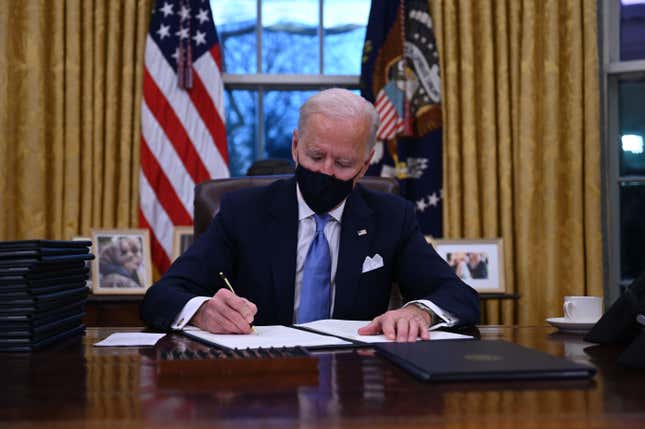Let's Check in and See How the Media Covered the First Few Days of the Biden Presidency
Politics

After the 2016 election, four years of Trump, the 2020 election, and a literal insurrection, one would assume that establishment media had learned a thing or two about false equivalence and bothsidesism. Well, let’s take a look at some of the stories that have been published about the Biden presidency over the last few days, just to be sure…
First, a piece from the New York Times about Biden’s Peloton, which actually ran the day before his inauguration. The ostensible angle of the piece is about the potential security risks of the exercise bike, whose features include a built-in tablet that allow riders to create a profile, record their workouts, and stream classes. But tucked into this report on White House cybersecurity are multiple comments about how Biden owning a $2,500 bike is supposedly at odds with his appeals to working class values. “ … Peloton does not exactly comport with Mr. Biden’s ‘regular guy from Scranton’ political persona,” Times reporter Sheryl Gay Stolberg wrote. Further down the piece, Stolberg concedes that owning a Peloton might actually make “political sense” for Biden—since it suggests physical fortitude—“even if it clashes with Working Class Joe.”
On Friday, the Times ran an even more explicit story about the supposed class signifiers of the Biden presidency, reporting on Biden’s Rolex watch. The $7,000-or-so watch “is a far cry from the Everyman timepieces that every president not named Trump has worn conspicuously in recent decades,” the Times’s Alex Williams reasoned.
And now may I direct your attention to a Saturday report from the Associated Press, featuring two residents from Frederick, Maryland, who serve as local representatives for an organization called “Braver Angels,” dedicated to “bridging the political divide” between people like themselves—people who believe Biden actually won the 2020 election and people who believe in a vast conspiracy involving a Democratic-led cabal of pedophiles. What’s the middle ground between those two views again?
In this sick and scared country, many have retreated to their bubbles, surrounding themselves with people certain the other side is their enemy — inhuman, un-American. …
So Carpenter and Abbas decided to navigate one of the tensest weeks in American memory together, as the Trump administration ended and Biden’s began. [Natalie] Abbas, who flirts with the QAnon conspiracy theory that a cabal of child-killing pedophiles runs the world, still desperately wanted to believe it wouldn’t happen. [Jim] Carpenter could barely wait for the new president, one he believes is a man of character capable of leading the country off this dark and dangerous path.
“People are getting threatened on both sides,” he said. “People are going berserk.”
“It’s crazy,” Abbas replied.
“So tell them to stop. Can you tell them to stop?”
“Can you tell your people to stop?”
They both sighed.
While distinct in many ways, together these three stories represent some of the media’s worst Trump-era impulses, now brought into the post-Trump era. In the first two, the Times suggests that owning expensive items like a costly watch or exercise bike might betray one’s politics, or align oneself with a figure like Trump, who also happens to like expensive things. I’m immediately reminded of a famous (to me) 2018 Newsweek headline about Bernie Sanders’s coat—once again an object of fascination for some—which read: “Socialist Bernie Sanders Wears a $700 Jacket While Complaining About Rich People.” Biden certainly does not endorse the same democratic socialist agenda as Sanders, but that’s the problem, in my book—not his $2,500 exercise bike. To discredit someone’s politics by way of their material possessions is a hallmark of the right, whose appetite for uncovering supposed hypocrisy trumps all else.
And while AP’s piece about “bridging divides” may be clear about what distinguishes its subjects’ positions from each other, it buys into a romantic narrative about “civility” and the possibilities for relationships among people with diverging political opinions. And in such pieces that’s what these differences ultimately amount to—political opinions.
I can’t say I’m looking forward to more of this breathless reporting over the next four years, and I wish Biden would dispense with his own narratives about “healing” and “unity,” which make it seem as though it is possible to return to a country where it’s possible to talk about exercise bikes, or watches, or the unlikely friendship between a Democrat and a Republican. No such country has ever existed.